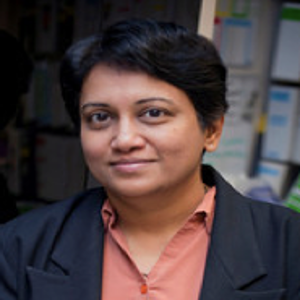Speaker Profile
Biography
Dr. Hegde is the VP and Chief Scientific Officer, Global Laboratory Services. She joined PerkinElmer on October 1, 2016. The focus of her clinical work is the development and implementation of high-throughput next generation sequencing (NGS) strategies for genomic disorders using sequence capture technologies, robotics, clinical exome and genome sequencing, and oligonucleotide array platforms. Dr. Hegde has over 20 years’ experience in clinical diagnostics which includes laboratory administration, management, extensive business and consulting experience in life science, genomic tools, and molecular diagnostic companies, from start-up to established organizations, and a proven record of driving revenue growth and profitability through growing existing businesses, building new businesses, and developing strategies to enter new markets by effectively influencing others to achieve shared goals. Dr. Hegde has extensive knowledge of CLIA regulations related to LDTs and NGS and a strong understanding of current reimbursement landscape and new CPT coding guidelines. Most recently Dr. Hegde was with Emory Genetics Laboratory in Atlanta where she was Professor, Human Genetics and Pediatrics and Executive Director and Chief Scientific Officer of Emory Genetics Laboratory. She received a B.Sc. and a M.Sc. from the University of Bombay, India, and a Ph.D. from the University of Auckland, New Zealand. She completed post-doctoral studies at Baylor College of Medicine and is American Board of Medical Genetics certified in Clinical Molecular Genetics.
Talk
From Newborn Screening to Whole Genome Sequencing
Newborn screening (NBS) is a successful public health program that enables the early identification of individuals with metabolic, endocrine, and other disorders, creating opportunities for early intervention and reduced morbidity and mortality. NBS is currently conducted mainly through biochemical assays, which are inexpensive and quick to perform, often using molecular methods as second-tier follow-up testing to confirm positive results. With the advent of next generation sequencing (NGS), the costs for molecular testing have dramatically decreased, bringing the possibility of using molecular methods as primary NBS testing modalities into the realm of possibility. The most comprehensive molecular test currently available is whole genome sequencing (WGS). Cord blood and cord tissue banking is the process of collecting and storing umbilical cord blood and tissue for the purpose of maintaining stem cells for potential future medical use. Nearly 80 life-threatening diseases can be treated using blood stem cells, including metabolic diseases, cancers, blood diseases, and immune disorders. Cord blood has been shown to be effective in lessening the symptoms of cerebral palsy and research is currently being conducted into the efficacy of cord blood therapy for treating autism. Currently, however, as many of these disorders are not detected by NBS programs, the need for these therapies is often not known until the affected individual starts showing symptoms, by which time optimal treatment windows may have passed. We have implemented the GenerationTM Whole Genome Sequencing Test to combine the power of WGS with the potential of cord blood and tissue banking. We have optimized WGS on stored cord blood and dried blood spot (DBS) cards using a PCR-free protocol, followed by sequencing on the Illumina NovaSeq, and bioinformatic analysis using Edico Dragen and an internal variant interpretation platform, ODIN. After sequencing, ~2500 curated genes are analyzed for infant and pediatric onset conditions and a report is generated for pathogenic and likely pathogenic variants identified in these genes. Adult onset disease genes are not analyzed – the sequence data for these genes is bioinformatically partitioned from primary analysis directly to archive storage. When the child turns 18, he or she can consent to the return of the rest of the WGS results, including adult-onset medically actionable and adult-onset medically non-actionable diseases. There are also options for reanalysis in the future as new disease genes are discovered, and for future reanalysis as diagnostic WGS in the event that the child becomes ill with a suspected genetic disease not detected in a known disease-causing gene at the time of testing.If diagnostic findings are discovered, as in a NBS program, there may be opportunities for early intervention and reduced morbidity and mortality; even in cases where no treatment is available, the diagnostic odyssey may be avoided. If a disorder is discovered that has a potential treatment in cord blood therapy, the diagnosis will likely have been made much sooner than if it was necessary to wait for the first symptoms to appear. This advance warning will allow for thorough planning and optimization of treatment timing. Parents can also order WGS testing for themselves in the GenerationTM program. Their consent process upon sample submission will include deciding what types of results to be returned, including carrier results, pharmacogenetics results, and adult-onset medically actionable and adult-onset medically non-actionable diseases. Submission of parental samples will also aid in interpretation of their child’s results as segregation studies will be able to be performed. The GenerationTM program was recently launched and samples have started to be submitted. Data will be presented on results from the first 50 submitted samples alongside data from samples received from sick children for clinical testing for WGS. Also discussed will be programming issues such as consenting and patient education, return of results, and unexpected or unusual outcomes or case studies. This is the first such program which drives the promise of personalized medicine from newborn screening to newborn genome sequencing.





